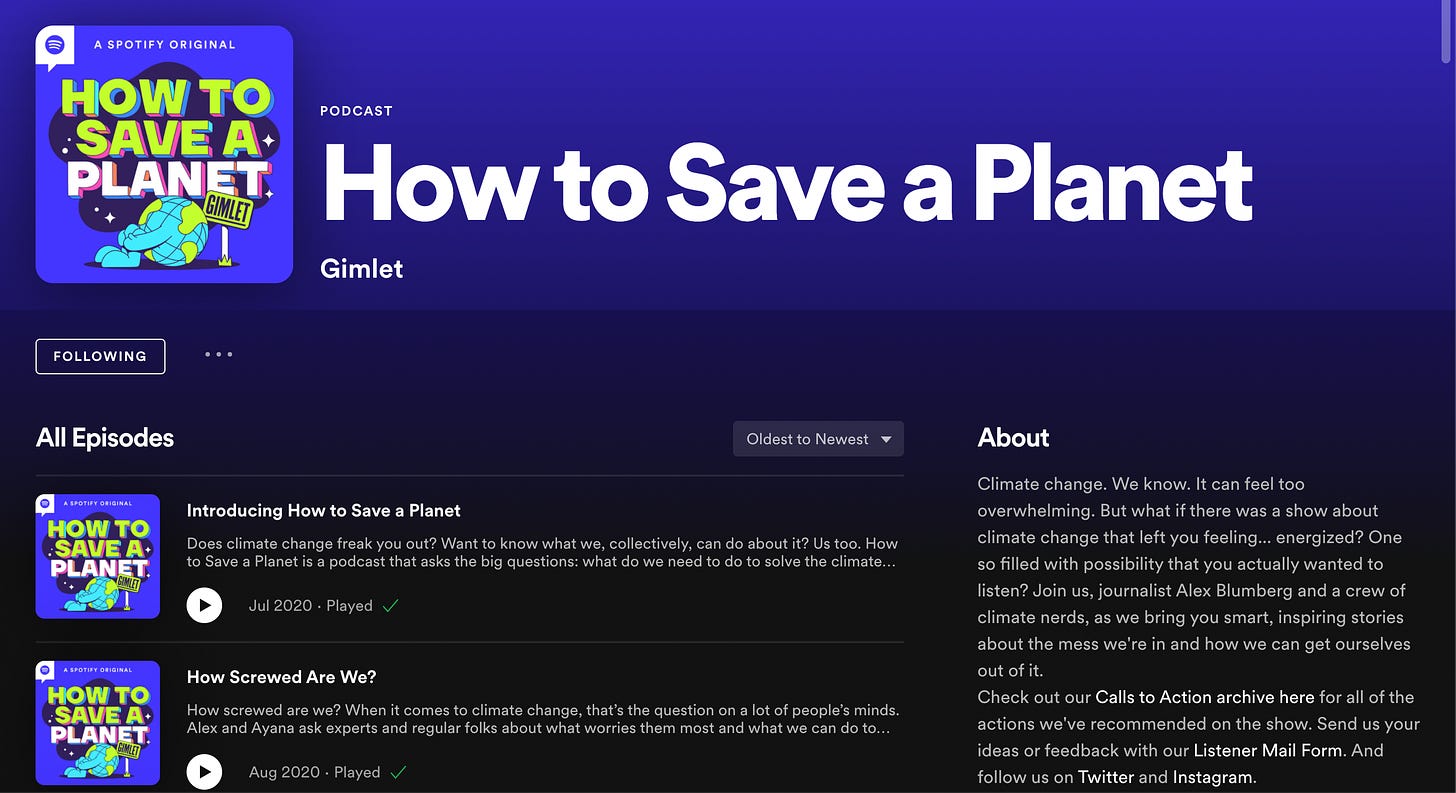Spotify axes environmental podcast “How to Save a Planet”
The changes prompted the termination of at least 38 Parcast and Gimlet employees.
Spotify recently announced that a handful of its original podcasts are on the chopping block as it shifts its focus to some of its bigger hits and more exclusive content.
Of 500 total, Spotify canceled 11 shows, including the environmental hit “How to Save a Planet.”
Spanning over two years, co-hosts Ayana Elizabeth Johnson, who is a marine biologist, and climate journalist Alex Blumberg have engaged in the topic of climate change in a way that’s entertaining and relatable for listeners, most of whom are, presumably, non-experts. The two, paired together, mastered the skill of turning a difficult science-heavy topic into a comfortable conversations.
Throughout the duration of the series, episodes covered everything from environmental racism, the impact of electric cars, and how to talk with family about climate change to “Black Lives Matter and The Climate” and “How to Make Republicans Environmentalists Again.”
All 11 shows that Spotify canceled were produced under small podcast studios Parcast and Gimlet, which Spotify acquired in early 2019 in one of its first steps toward establishing its own original podcast programming. In August 2021, Business Insider reported on leaked data that had already revealed then Gimlet’s struggle to keep up with the success of the audio streaming giant and most of its subsidiaries.
The other canceled shows include Gimlet’s “Crime Show” and “Every Little Thing” and Parcast’s, “Medical Murders,” “Female Criminals,” “Crimes of Passion,” “Dictators,” “Mythology,” “Haunted Places,” “Urban Legends” and “Horoscope Today.”
In a joint statement from the two unions representing Parcast and Gimlet employees, the organizations stated that Spotify’s cutbacks impacted about 30% of their staff. The changes cost the jobs of at least 38 employees, including high-profile climate reporter Kendra Pierre-Louis, who confirmed in a tweet on Oct. 6.
Some were given as little as an hour to close their work, according to the statement.

“These aren’t small cuts, they are massive restructurings,” Parcast and Gimlet wrote in the statement as a rebuttal to Spotify’s claim that the layoffs impacted only 5% of people working in original podcasting.
Though Spotify’s number was accurate, it took into account the employees of its entire podcasting catalog; whereas, Parcast and Gimlet operates much smaller staffs.
The reason behind the cancellations, according to the joint statement, was low traffic numbers.
“But decisions Spotify leadership made directly contributed to those low numbers,” the unions wrote. “Their decision to make most of Gimlet’s and Parcast’s shows Spotify exclusive caused a steep drop in listeners — as high as three quarters (75%) of the audience for some shows. Yet the company did little or nothing to staunch the bleeding.”
In July 2021, “How to Save a Planet” — which previously available on other listening platforms — became Spotify exclusive, according to the podcast’s Twitter account. The announcement, which remains the podcast’s pinned tweet, was met with discourse and suggestions to reconsider. At the time, Spotify faced backlash for its decision to allow political commentator Joe Rogan to diffuse anti-vaccine rhetoric amid the global pandemic.
The unions also suggested in the joint statement that some of the canceled podcasts were among Spotify’s most popular shows, which added to the confusion and suggests that the cuts weren’t solely due to the programs’ success.
“And yet, Spotify has failed to give any explanation for how they evaluated who would be let go,” the statement, which they shared on Twitter, reads.
Spotify reviews shows that “How to Save a Planet” received a 4.8-star rating (out of 5 stars) across more than 1,200 listeners. Between Instagram and Twitter, the podcast had more than 38,000 followers on social media.
“Yesterday, Spotify chose to create chaos instead of treating employees with the dignity and respect they deserve,” the two unions concluded.
Did you enjoy reading this? It was made possible by readers. This news site is 100% independent and funded by readers. Please support our coverage by becoming a subscriber or making a donation today.
Let’s Talk Earth covers all things nature, outdoors, climate, wildlife & our greater earth.
Note: All subscribers on Substack will automatically receive free entry to the Let’s Talk Earth members-only content.




